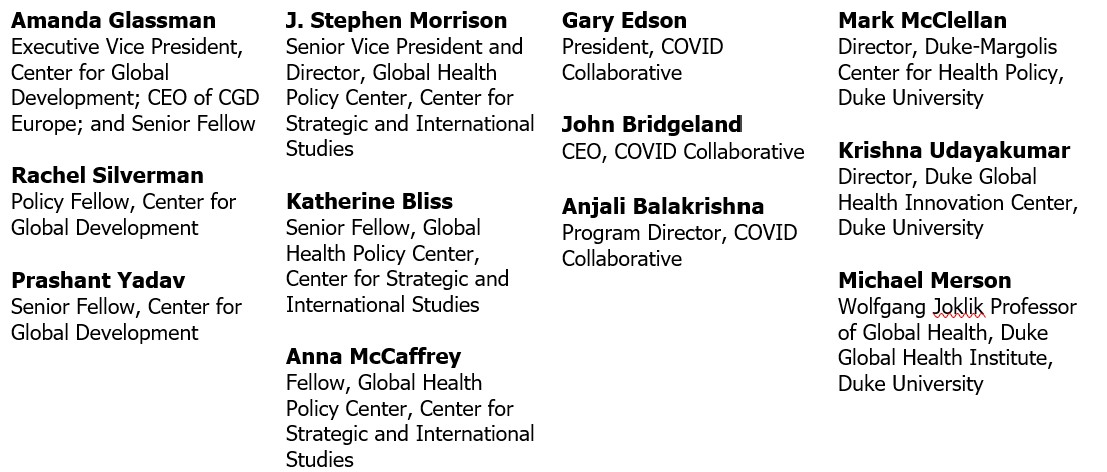Press Release
U.S. Global Health Experts Urge G7 Action to Vaccinate the World Quickly and Equitably

U.S. Global Health Experts Urge G7 Action to Vaccinate the World
Quickly and Equitably
Open Letter to G7 leaders proposes five-point action plan – including sharing of at least one billion doses worldwide this year and striving to vaccinate at least 60% of every country’s population in 2022
WASHINGTON – A coalition of global health experts today called on the Group of Seven (G7) leaders to share at least 1 billion, and aim for 2 billion, vaccine doses to low- and middle-income countries by the end of this year, and more urgently help countries distribute and deliver vaccines quickly and equitably across their populations, striving to achieve at least 60%, and ideally 70%, vaccination coverage in every country in 2022.
President Biden and his G7 counterparts will meet at their annual summit on June 11-13 in the United Kingdom, and global vaccination efforts will be on their agenda.
In an Open Letter, representatives of four U.S.-based organizations – Center for Global Development, Center for Strategic & International Studies (CSIS), COVID Collaborative, and three units of Duke University – together with the endorsement of renowned global health experts – urged the G7 leaders and member states to use their vaccine expertise and manufacturing capacity to accelerate global access to vaccines while meeting domestic health needs.
The experts said that today’s global vaccine gap is a supply problem and also a massive distribution and delivery challenge. There are alarming gaps in vaccine distribution and delivery capacity across much of the world that require urgent attention and more resources. “Delivery capabilities and vaccine hesitancy, not supply, are likely to be the critical bottleneck to vaccinations in most low- and middle-income countries within the next 6 months,” the letter said.
The letter highlighted that G7 members have unique resources and capabilities, as well as a legacy of high-impact, collaborative leadership during past crises, and that the coming months are a critical period for leaders to address catastrophic outbreaks in many countries, preempt further growth of the virus elsewhere, and prevent the unchecked spread of the virus from spawning new variants that threaten everyone.
The coalition is asking the G7 leaders to adopt an action plan that includes the following initiatives:
- Establish a G7 Vaccine Emergency Task Force, open to additional nations and organizations, to provide transparency, predictability, and accountability to the global sharing of vaccines and the vaccine marketplace. As G7 members develop excess vaccine supplies beyond what is needed for domestic use, accurate projections based on real-time country data will facilitate more effective and coordinated global vaccination distribution and prioritize countries with the most urgent need.
- Develop and commit to a path to share at a minimum 1 billion doses, with the aim of 2 billion doses, of G7-authorized vaccines before the end of 2021, and ensure the availability of enough doses to enable broad vaccination in every country as soon as possible in 2022. As supply continues to increase quickly, the G7 and EU should approach dose-sharing with far greater urgency and intensified systematic planning to meet global needs.
- Implement a coordinated G7 strategy to immediately increase production of high-quality, well-regulated vaccines, with the goal of further increasing access to these vaccines across the rest of the world. This includes addressing distribution bottlenecks, removing export restrictions and other barriers, and cooperating to provide essential raw materials, equipment and supplies over the next several months.
- Accelerate development of high-quality globally distributed manufacturing capacity by bringing together public and private sector stakeholders and using voluntary licensing agreements, with a focus on Africa, Asia outside of India, and Latin America. This effort will require establishing cooperative agreements that provide access to financing through both public and private sources, including USDFC, IFC/World Bank and local private funding. The G7 should set a target to finalize at least five such public-private agreements by the end of 2021, each leading to the establishment of vaccine manufacturing capacity before the end of 2022.
- Increase bilateral and multilateral technical and financial support to low- and middle-income countries to enhance their vaccine distribution and delivery capabilities, and address vaccine hesitancy, with three specific goals: achieve demonstrated national vaccination preparedness in each country by the end of 2021; strive for at least 60%, and ideally 70%, vaccination in every country in 2022; and avoid significant excess vaccine stockpiles ahead of pandemic control in all nations.
The health experts said the G7 members are on a path to contain the pandemic in their respective countries, and to meet the moment, must work to assure the fastest possible path to access to billions of doses of high-quality vaccines – and ensure local capacity to deliver them – complementing ongoing multinational efforts.
The signatories to the open letter include the following:

The following individuals have formally endorsed the letter:
Thomas J Bollyky, Senior Fellow, Council on Foreign Relations
William H. Frist, former US Senate Majority Leader
Helene Gayle, President and Chief Executive Officer, The Chicago Community Trust
Scott Gottlieb, Resident Fellow, American Enterprise Institute, and former Commissioner of the US Food and Drug Administration
Margaret (Peggy) Hamburg, former Commissioner of the US Food and Drug Administration, and former Foreign Secretary of the National Academy of Medicine
Amb [ret] Jimmy Kolker, former Assistant Secretary, Global Affairs, Department of Health and Human Services
Jack Leslie, Chairman, Weber Shandwick
Jennifer Nuzzo, Associate Professor, Johns Hopkins Bloomberg School of Public Health
Carolyn Reynolds, Co-Founder, Pandemic Action Network, and Senior Associate, Global Health Policy Center, CSIS
The full text of the Open Letter can be viewed here.
For more information, please contact:
Patricia Green, Duke-Margolis Center, patricia.s.green@duke.edu, mobile: +1-301-520-6482